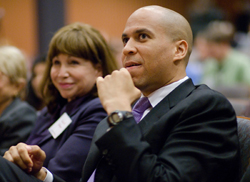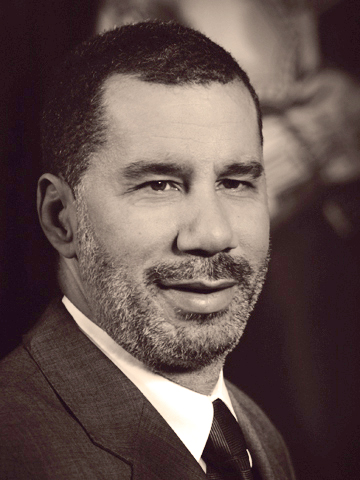Filed Under > Convocation
Honor Bound
Newark Mayor Cory Booker, former Barnard College President Judith Shapiro, Teachers College Professor Emeritus Antoinette Gentile and New York Governor David Paterson will receive the College's Medal for Distinguished Service at its 2009 Convocation exercises in May.
Newark Mayor Cory Booker, former Barnard College President Judith Shapiro, Teachers College Professor Emeritus Antoinette Gentile and New York Governor David Paterson will receive the College’s Medal for Distinguished Service at its 2009 Convocation exercises in May.
Booker, Shapiro and Paterson will receive their medals at the ceremonies for master’s degree candidates on the afternoon and evening of Tuesday, May 19. Gentile will receive her medal at the doctoral ceremony on the afternoon of Wednesday, May 20. All ceremonies will be held at Riverside Church in Manhattan
Booker, who also serves as a Trustee of Teachers College, won election as Newark
In 2000, he lived for five months in a mobile home, parking on street corners where drug dealers were rampant. (He lived for a few years in one of Newark
Gentile, who retired in spring 2008 after 44 years on the TC faculty, is an internationally recognized leader in movement sciences and neuromotor research. Beginning in the early 1970s, Gentile pioneered the applying of theories of brain function in movement disorders to patient treatment. Previously, treatment had been shaped largely by defining the extent of damage to patients’ brains. Gentile, whose training encompassed neuro-anatomy, movement, motor learning and developmental research, focused instead on the impact of environment on brain function and the potential for behavioral change. She was an early champion of the notion of “neuroplasticity”—the concept that the brain can reorganize following trauma, shifting functions to new regions.
Paterson, who is legally blind, became known early in his career for his powerful advocacy on behalf of minorities, women and those who are physically and visually impaired. The son of Basil Paterson, Harlem’s longtime champion and the first African American to serve as New York ’s Secretary of State, he is recognized for his far-reaching understanding of health issues ranging from diet and exercise to stem-cell research, and for his leadership in the fight for such measures as New York State Paterson
Shapiro—the first woman ever appointed to the Department of Anthropology at the University of Chicago —achieved early fame for her pioneering work on social theory and gender differentiation among the Tapirapé and Yanamamo peoples in South America . In 1994, after serving as Provost at Bryn Mawr College
Published Monday, Apr. 27, 2009

